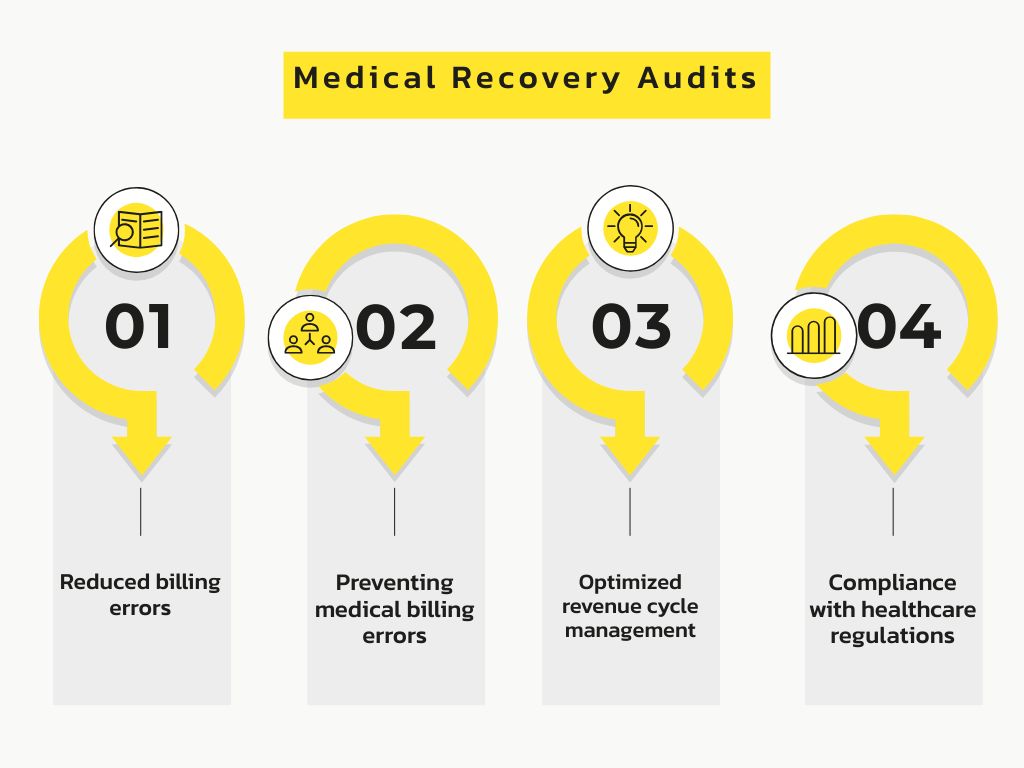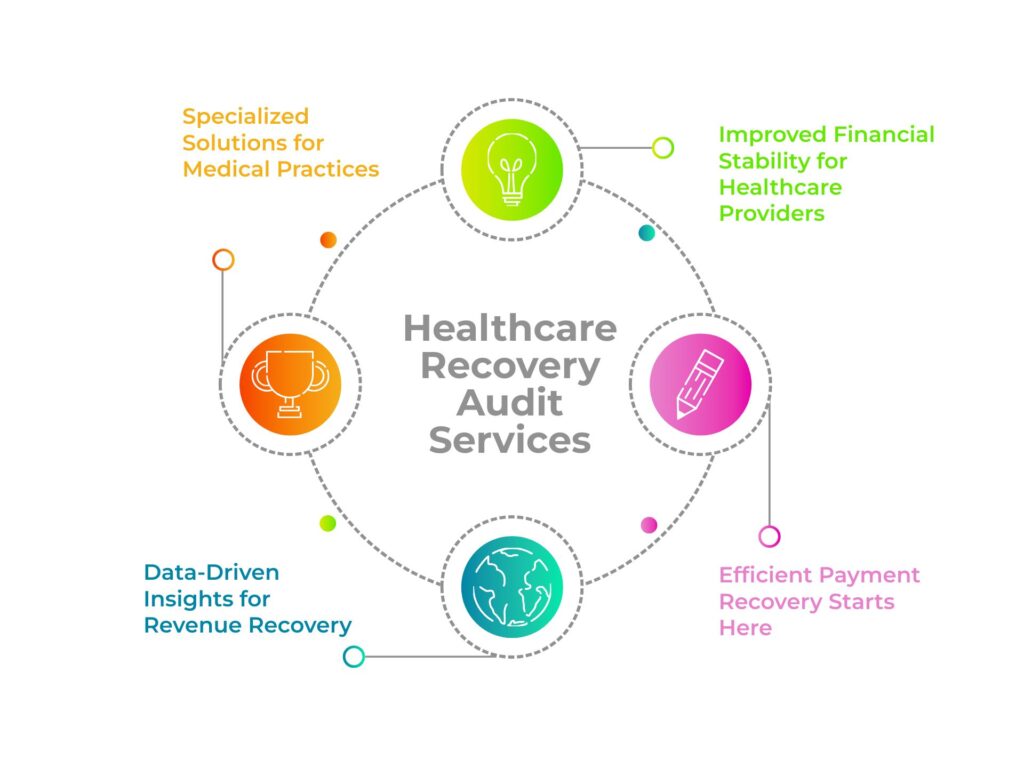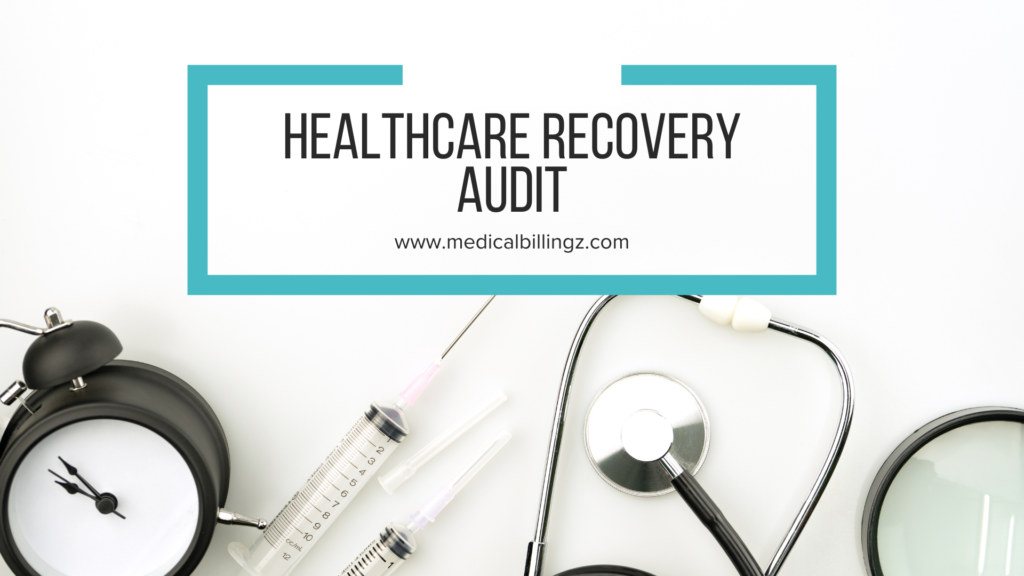The healthcare sector is a complicated network of financial transactions, rules, and services. Errors are unavoidable due to the massive volume of medical billing and claims. In order to find, fix, and recover overpayments or underpayments in the healthcare system, healthcare recovery audit services are essential.
What Are Healthcare Recovery Audit Services?
The term “healthcare recovery audit services” describes the methodical examination of medical claims to verify the accuracy of payments made by insurance companies or government initiatives like Medicare and Medicaid. These audits are conducted by internal teams or specialized third-party organizations that examine claims in order to find inconsistencies, spot overpayments or underpayments, and retrieve the appropriate sums.
Recovery audits are crucial to preserving government programs’ and healthcare organizations’ financial stability. Significant financial losses, inefficiencies, and non-compliance with healthcare regulations can result from mistakes made when processing claims.
The main goals of recovery audit services for healthcare
The following are the main goals of Healthcare Recovery Audit Services:
- Finding Billing Errors: Making sure that medical professionals receive fair compensation for their work by spotting overpayments, coding mistakes, and incorrect payments.
- Recovering Overpayments: Getting back any money that was given to medical facilities or providers in excess.
- Ensuring Compliance: Promoting adherence to regulations and standards to minimize future errors and ensure compliance with healthcare laws.
- Improving Efficiency: Streamlining the payment process by reducing the volume of improper claims and promoting accurate billing practices.
The Kinds of Mistakes Healthcare Recovery Audit Services
Find The primary goal of healthcare recovery audit services is to find various kinds of payment irregularities that arise when claims are submitted.
Among the most frequent mistakes are:
- Overpayments: Take place when medical professionals get paid more than they are entitled to because of incorrect billing codes, overlapping claims, or overcharging for services.
- Underpayments: Occurs when providers receive inadequate compensation as a result of inaccurate coding or the omission of some services that were entitled to reimbursement.
- Coding mistakes: Erroneous payments may result from improper use of medical codes, such as ICD (International Classification of Diseases) and CPT (Current Procedural Terminology) codes.
- Claims filed for patients who might not be qualified for the services provided or for benefits that are not applicable are known as eligibility errors.

The Value of Audit Services for Healthcare Recovery
In order to preserve the healthcare system’s financial integrity and transparency, healthcare recovery audit services are essential. The industry may suffer significant financial losses as a result of overpayments, fraud, and inefficiencies in the absence of these audits. These services have the following advantages:
Protection of Government Program Funds
Medicare, Medicaid, and other government healthcare programs depend on healthcare recovery audits. These programs have limited funding, and identifying incorrect payments guarantees that money is distributed properly, avoiding needless stress on public resources.
Lessening the Payers’ Financial Burden
Healthcare Recovery Audit Services are also advantageous to private insurance companies because they lessen the financial strain brought on by overpayments and false claims. Audits assist in making sure that
Better Billing Procedures for Suppliers
Healthcare Recovery Audit Services point out areas where billing procedures need to be improved for healthcare providers. Providers can improve their revenue cycle management and steer clear of future fines by locating and fixing coding errors or compliance problems.
Want to know how to revolutionize your Recovery Audit Services?
Adherence to Regulations
Compliance is essential in the highly regulated healthcare industry. Recovery audits assist in ensuring that healthcare providers and payers adhere to federal and state regulations, including the Centers for Medicare & Medicaid Services (CMS) guidelines, reducing the risk of non-compliance penalties.
Reducing Fraud and Abuse
Fraud and abuse in healthcare claims are significant concerns for both government programs and private payers. Healthcare Recovery Audit Services serve as a deterrent against fraudulent claims and identify areas where abuse might be occurring, contributing to a
The Operation of Healthcare Recovery Audit Services
Healthcare Recovery Audit Services examines and recovers incorrect payments in a methodical manner. The following steps are part of the standard procedure:
Information Gathering and Evaluation
Gathering pertinent information from government programs, insurance companies, and healthcare providers is the first stage in the audit process. Patient records, billing codes, claims information, and payment histories are all included in this data. Large datasets are frequently sorted through using sophisticated data analytics tools to find trends in overpayments, underpayments, or other disparities.

Evaluation of the Audit
Audit specialists, such as financial auditors, medical coders, and specialists in healthcare compliance, then examine the gathered data. Inconsistencies like inaccurate billing codes, redundant claims, or problems with medical necessity are found during this stage.
The Function of Technology in Recovery Audit Services for Healthcare
Healthcare Recovery Audit Services are now much more accurate and efficient thanks to the introduction of cutting-edge technology, especially artificial intelligence (AI) and data analytics. Numerous benefits are provided by these technologies in the auditing process, such as:
Claims Review Automation
The time it takes to find payment irregularities can be greatly decreased by using AI-powered systems to automate the review of medical claims. Additionally, automation reduces human error, improving the accuracy of audits.
Key Features of Healthcare Recovery Audit Services
| Feature Description |
| Billing Errors Detects overpayments and underpayments |
| Coding Review Ensures accurate use of medical codes |
| Financial Recovery Recovers funds from overpayments |
| Compliance Audits Ensures adherence to regulations |
| Fraud Detection Identifies fraudulent claims |
| Data Privacy Maintains confidentiality and security |
Analytics for Prediction
By examining historical claim trends, predictive analytics tools can identify possible areas of payment disparities. This increases the audit process’s efficiency by enabling auditors to concentrate on high-risk claims.
Learning by Machines
In order to enhance subsequent claim reviews, machine learning algorithms can continuously learn from audit results. Over time, these algorithms improve audit accuracy by adjusting to changing healthcare billing practices.
The Blockchain Technology
Healthcare transactions can be secured with blockchain technology, guaranteeing transparency and thwarting fraud. Auditors can use its tamper-proof ledger to confirm that claims and payments are accurate.
Want to know how do Healthcare Recovery Audit Services help reduce healthcare fraud?
Healthcare Recovery Audit Services’ Difficulties
Despite their many advantages, healthcare recovery audit services have a number of issues that must be resolved for best results. Among these difficulties are:
Complicated invoicing systems
The audit process may be challenging due to the intricacy of healthcare billing, which involves a large number of codes, procedures, and regulations. Despite the use of sophisticated technology, auditors still need to have a thorough understanding of the healthcare system.
Provider Opposition
Because of the possible financial penalties and the perceived administrative burden, healthcare providers may oppose audits. This may cause conflict between auditors and providers and slow down the recovery process.
Issues with Data Privacy
Maintaining confidentiality throughout the audit process is essential due to the sensitive nature of patient data.
In summary
Assuring the correctness and equity of payments, healthcare recovery audit services are an essential part of the healthcare sector. These services promote regulatory compliance, lower fraud, and safeguard the financial interests of payers and providers by detecting and recouping payment discrepancies. With ever-increasing efficiency, accuracy, and real-time capabilities, the future of healthcare recovery audits appears bright as technology develops.
FAQs
What are the advantages for healthcare providers of using healthcare recovery audit services?
These services lower the likelihood of future financial penalties for healthcare providers by assisting in the identification and correction of billing errors. They also strengthen regulatory compliance and revenue cycle management.
What part does technology play in the services provided by Healthcare Recovery Audit?
Technology is essential to increasing the precision and effectiveness of healthcare recovery audit services, particularly artificial intelligence (AI), machine learning, and data analytics. These technologies aid in automating the review of claims and identifying fraudulent patterns.
What difficulties do services for healthcare recovery audits encounter?
The intricacy of healthcare billing systems, provider opposition because audits are seen as burdensome, and the requirement to preserve patient privacy are among the difficulties. guaranteeing adherence to laws like HIPAA.

